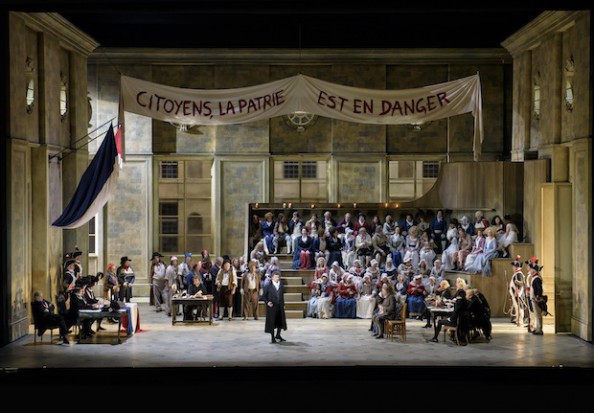Who on earth could have predicted that a hoary old operatic melodrama set in revolutionary France would find resonance in the present where the pen as a weapon against bigotry and hypocrisy has suddenly achieved iconic status. But hold up, let’s not get carried away. We’re talking about Giordano’s Andrea Chénier. Though its eponymous poet does indeed extol free expression at the service of love, the sentiments — the voices of reason in a time of high anxiety — don’t run too deep. And so we’re back where we started, with a hoary old melodrama.
So how to stage something that only gets staged in the first place if you have an extraordinary trio of singers fully ripened for the occasion — including a tenor of dashing and heroic timbre who can cut a suitably sympathetic and romantic figure before Madame Guillotine does likewise with him. The paradox, of course, is that this brand of opera was dubbed verismo when nothing could have been further from the truth. Though we begin in what might be seen as grand opera’s ‘comfort zone’ — an opulent estate just outside Paris, where the director David McVicar and his designers Robert Jones (set) and Jenny Tiramani (costumes) hurl money at the stage and dress — something surely has to give once we reach Paris. It doesn’t.

The opera itself starts promisingly. Giordano and his librettist dare to give a mere footman the stage before the aristocrats — led by the haughty Contessa di Coigny (Rosalind Plowright) — begin yet another elaborate party with yet another elaborate gavotte. Carlo Gérard — the impressively sonorous Zeljko Lucic – sings of his disgust and hatred of his masters. At the height of his ire McVicar has six crystal chandeliers rise from the floor in a gesture that certainly chimes with the music but only in the sense that it is resolutely cheesy. The peasants, of course, are not nearly revolting enough when they inevitably crash the party and arrive in Paris in act two (surely the moment to pull the rug from beneath us and let the darkness descend in some physical sense). Even the slogans look like they’ve been daubed in Dulux, not blood. Giordano keeps the violence pretty much out of sight; McVicar seems bent on keeping it out of mind. It’s the Carry On film Don’t Lose Your Head without the jokes.

But most of the audience had come to celebrate the most exciting tenor of the day without the distraction of a meaningful drama — and Jonas Kaufmann (pictured right) did not disappoint. Chénier’s poetic exhortations were fleshed out through his swarthy middle voice to the most thrillingly open top in the business. That aspect of Eva-Maria Westbroek’s Maddalena brought only modified rapture. An account of her big set-piece, ‘La mamma morta’, was ultimately rendered anti-climactic by faltering intensity and a money note distinctly lacking in height. I also wanted more of an Italianate mettle in the sound and temperament. Still both singers’ generosity of tone and spirit was a pleasure in itself and in their act two duet both floated lovely phrases rapt in anticipation.
So a superficial excitement, to be sure.All of it leads to the final stonking minutes of the piece where Antonio Pappano — whose prowess in this repertoire is second to none — scented the lovers’ immortality and whipped up the X-Factor hysterics in the audience to a frenzy. But drama? Sad to say this offering — so untypical of McVicar at his best — was theatrically moribund.






Comments